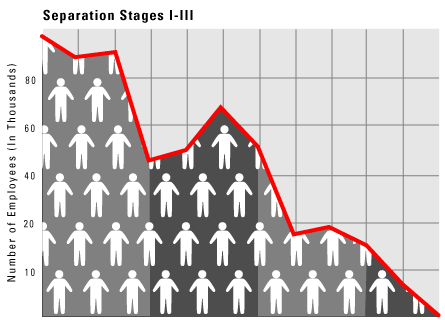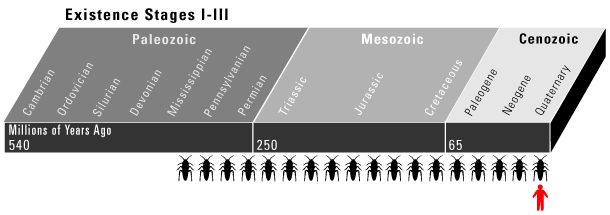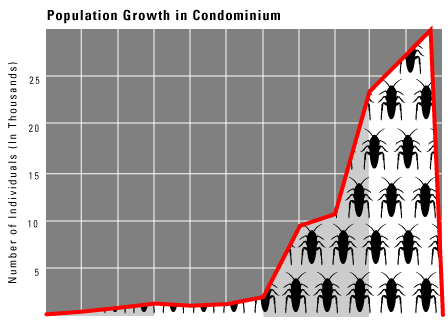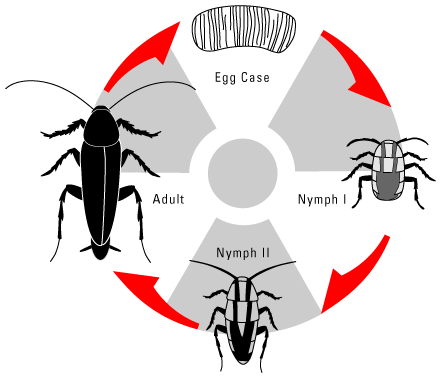01/10/2010
I couldn’t tell Barb about the roaches. She wouldn’t understand. She’s a zero-tolerance kind of woman, the kind I loved or should say needed. There would be no debate on the issue, not with bugs, not with this many bugs even though they were marvelous conversationalists and had a team dynamic any manager would die for.
When I found one in the kitchen last Tuesday at 3 am, I’ll admit I felt an instinctive desire to kill it. I woke up hungry, the way I did after any series of nauseating days, so I slipped out of bed, crept downstairs and grabbed a cold hot dog wrapped in a slice of American cheese from the back of the fridge where I hide the stuff behind three jars of flaxseed. Barb doesn’t allow that kind of food in the house. We are what we eat. Do we choose to be processed meat? Do we choose to be cheese product? She had a point.
I was polishing off a second one when I saw a roach darting along the edge between the sink cabinet and the floor.
I wanted to step on it, but I didn’t have slippers on and the bug was fat as my thumb. So I grabbed a tumbler from the shelf, one of the gold-rimmed ones Barb liked. After baiting it with a corner of Velveeta, I dropped to my hands and knees, placed the glass on the floor in front of the bug and got so close I could see the hairs of its tiny roach legs. Its delicate antenna bobbed. The body glistened. Then in a voice so high-pitched and fine I could barely hear, it said: “Exterminator!”
I blinked. “What?”
“Exterminator!”
I got the cold-hands-hot-neck feeling I’d had in meetings all week. “I am not an exterminator. I’m just going to take you outside.”
The house shuddered with a gust of wind. The night was bitter. I could picture the scene: the snow outside gray and shabby-looking under a filthy layer of ice, the little roach, belly-up, its little mouth frozen in an open scream like the carbonite Han Solo.
“There’s no choice, buddy. If Barb sees you, she’ll do worse, I promise. She’ll call a pest guy, a—”
“Exterminator!”
“Stop it!” I rubbed the bald patch atop my head. It had been a hard week. I couldn’t deal with certain words, ones like outplace, terminate or kill. “Look, I have to go back to sleep. You can stay if you keep out of sight. Understand?”
The roach hesitated. Its antenna twitched before it squealed, made a quick U-turn and scurried along the floor’s edge to slip into a crack between cabinets.
G-Force Associates was our biggest client ever—almost 3,000 employees which, by a consummate act of organizational change expertise, our team had to restructure to 500. Barb called us revitalization specialists—conservationists for corporate America. The downsized employees, however, called us Axe Men and sent nastygrams and terror texts.
Lost HOUSE, No INSURANCE, and my kid is DYING, thx 4 the FIRING!
merry x-mas U <3-LESS PRICKs!!!
But I wasn’t heartless. Unlike most everyone else at the firm, I knew what it meant to be laid off. It happened to me plenty of times, but rather than lashing out or blaming someone else, I tried to adapt. It’s like Barb said: Cut, convert or cope. She also liked There’s only one ‘I’ in ‘SURVIVE and Pity is for pussies. She didn’t share those with clients—only with her inner circle which I think included me.

Barb and I had been together almost four months. This was not quite long enough in her eyes to justify being partners, so she used the term provisional associate liaisons, although I’d moved in several weeks ago. She had a great house—a three-story Georgian with a library and a statue of naked Greek boys wrestling in the dining room. I’d only been at Frank & Stein about a year, but Barb got me onto the G-Force account, one of the firm’s most important clients, to prove myself. Normally, you weren’t allowed to date fellow colleagues, especially a subordinate, but the only rules Barb followed were the ones she made.
We met on a speed date. I’d signed up as a joke, a way to burn two hours, though I knew I was getting hopeless—spending more time getting laid off than getting laid and wasting time pursing the wrong kind of woman, the beautiful kind. I figured I should get realistic, lower my standards and go for someone lonely and rich. A Sugar Mommy.
The event took place at a swanky bar called Eden with inflatable palm trees, mist and plastic bananas hanging from the ceiling like the set for Tarzan porno. I drank scotch and soda because although I hate it, it looks classy. Barbara was the last woman I met. I recognized her immediately; I’d just started working at Frank & Stein and knew her from larger meetings with the big shots. She had a face like that farm wife in “American Gothic,” and sipped from one of the bar’s specialty drinks, a rum-filled coconut the size of a small bowling ball garnished with a straw and umbrella. It would roll away if you put it down, so she was holding it and that’s why I noticed her hands. I had a weakness for big-handed women and Barb’s were enormous. Midwestern. Hands that got things done.
The bell went off to switch partners, and we turned to face each other. Lots of women stood taller than me, though Barb was especially tall, maybe five-ten or eleven, probably six feet in heels. I stood to her neck, which she had covered with a hideous but expensive-looking scarf decorated with cat heads.
“You’ve got eight minutes,” she said. “Go.”
I asked the first thing that came to mind. “If you could exterminate one person on earth right now, who would it be?”
She squinted, a look that made her appear either interested or outraged. In time, I learned they were mostly the same to her. “Miley Cyrus,” she answered. “Next question.”
“Why did you wear that thing?”
My audacity scared the crap out of me. She could fire me just by thinking about it. Instead, she blinked, frowned and fingered a corner of the scarf. “What’s wrong with it?”
“It’s hideous.”
She squinted at me. Clearly, she never got this kind of effrontery, but a hint of something like pleasure flickered along her mouth and she introduced herself. I said I knew who she was because I, too, worked at Frank, although at that time, I acted simply a consultant helping laid-off employees find jobs. She said I was exactly the kind of short, ballsy man she could appreciate and invited me to have sex in her Lexus.
It went downhill from there. Lunch dates, happy hour drinks, dinner and movies, though we often cut out of the movies because she hated films and instead went to have weird sex at her place. If that’s what you could call it. She wanted me to order her around and make her to do things like scrub grout from the bathtub. I played along, improvised. Sometimes it was fun; other times I felt sorry for us both. But Barb made me good at feigning self-assurance. Around most people, I was confused and shy, even incompetent, but the way she put me on edge filled me with giddy, euphoric confidence—the way I used to feel when thinking about suicide. Was that a good thing? As time went on, it didn’t matter; Barb and I were a pair. It was like a decision made by a group of important and powerful strangers, people who didn’t care about me at all.
I couldn’t get much sleep. Early mornings, a high-pitched giggling taunted me from the corners of rooms before we left for work and at night I detected the light click of mandibles. I said nothing to Barb, though; she had the patience for neither bugs nor a provisional associate liaison who hears things. But on my next nighttime food raid, a glittering, dark pool of bodies awaited me in the kitchen.
“Good evening, Exterminator!”
“You again.”
“We again!”
We got to talking. I discovered the ‘exterminator’ thing was nothing personal: the roaches referred to all humans that way and to themselves simply as ‘we.’ Over the next few days and nights, I discovered they thought and spoke collectively, so while I couldn’t really interact with just one or two of them, a crowd of five thousand could carry a fairly complicated conversation. Their favorite topics included food, mating, and Euler circuits, and they knew every stash place around the house—including the faux panel in the back of one of the lower pantry cabinets behind which I could hide whole boxes of Twinkies. However, the terms ‘I’ and ‘me’ confused them. Also, they couldn’t remember anything. I constantly had to remind them of my name.
“It’s Whalon Brown. Whalon. You know, like a whale?”
“What’s a whale?”
Their perspective fascinated me. They used a base-six number system to count and subscribed to an ancient belief that prophesied a second Golden Age—another Pennsylvanian period wherein roaches would again dominate the planet. They believed that theirs was the most advanced species in existence because they’ve been around since Pangea and have endured all manner of disasters. When I asked if bacteria might actually be more ancient and resilient, the roaches replied, “Bacteria have no culture,” then laughed for a good ten minutes.

I enjoyed their company. My kitchen visits continued over the next few days, turned into pow-wows creeping into the early hours of dawn. I’d munch my Twinkies, let a few golden crumbs fall to share and within minutes, the marble floor was half covered with their black and caramel-colored bodies. They made a terrific audience. I explained everything about the G-Force Associates transition—how the senior executives didn’t trust my abilities and the employees still sent threatening voice mails.
“If I could just take charge of my attitude, none of this would bother me. Like Barb—she’s a killer. And you guys with this ‘we’ business. Perspective, is what I’m saying. Does that make sense?”
“There’s only one ‘we’ in survive,” the roaches said.
“Like right now, I’m wondering: Why am I working at Frank? Am I making the world a better place, or a not-better place?” I sighed, brushed the crumbs from a Swiss Cake Roll onto the floor where a phalanx of bodies attacked them. “I don’t even know what I want for the future—what I should really fear, or hope for.”
“What is ‘fear’?” they asked. “What is ‘hope’?”
Last Saturday, I brought the laptop into the kitchen and screened some of the old films I made in college. I’d double majored in philosophy and film and made several 8mm shorts, which I transferred to digital a few years back so I could watch them at work. They soothed me. I’d never shown them to anyone, especially Barb, who thought the idea of art imitating life was a waste of time. Whalon, the only things that matter are real.
I showed the roaches two of my favorite scenes: a man and a woman sharing a banana split on a curb, and discussing whether or not man had already sown the seeds of his own destruction; then, two women carpooling to work who run over a wolf. I shot the films in black and white, and they ran no more than about fifteen minutes each. Both had terrible sound and bad lighting. The roaches, however, were riveted. They applauded each film, demanded encores. After a while, they’d forgotten what they’d seen, so I’d repeat the clips, and they’d watch once more as if for the first time and cheer all over again.
They stayed out of Barb’s sight despite a number of close calls. One time, I walked in the bathroom and found a line of them crawling up the wall while she soaked in the bath, a warm towel over her eyes. I had to lure them out with a Ding Dong. Another time, I woke up early and found a giant female loaded with eggs sitting in the middle of her forehead like a third eye. It took a full minute for me to gather my nerve and pluck the thing off.
But they couldn’t hide forever. Finally, one night during dinner, a giant nymph leapt from the chandelier to land on Barb’s head. I nearly choked on my Chablis.
“What’s wrong?” she asked. Her mass of fine, steel-gray curls was usually kept back in a tight bun, though at night it was unbound and exploded in a nimbus around her face. The roach got entangled near her shoulder.
“Oh my god—look!” I yelled and pointed behind her. Barb instinctively whipped her head around to the wide, bay window beyond the living room, flinging the roach to the table surface littered with papers, folders, and food. It had been a working dinner, so the laptops bumped against take-out cartons from the vegetarian place near the office. The bug landed on its back in a vat of hummus.
“What was it?” Barb asked, turning to me.
I tried to bite my fingernail, forgetting I had chewed every one of them off already, including the skin around them, during the morning meeting with G-Force’s senior executives. “A weird light. I thought it might be a spaceship.”
Barb was fifty-four, twenty years my senior but showing her age less on account of the fact that she thrived on work, let it fill every niche of her life. Even her own mind ran like a corporation, and right then, I knew an emergency meeting had been called behind those skeptical, gray-green eyes. I pictured the scene: the long, lacquered table full of Barbs, the Board of Directors, all of them in black pantsuits, drinking bottled water, adjusting their turquoise rings, lifting their chinless faces to the head of the table where Barb the CEO stood before them, forehead shining. Next to her, Barb the Consultant for Effective Separations reported the dire news: The performance measures for our provisional associate liaison, Whalon Brown, demonstrate a need for a core transformational realignment.
“Are you feeling all right?”
“Of course. It was—” She kept that hard look on me, the unblinking, laser stare. “It was probably just a mob of laid-off employees with torches. Or a passing car.”
The roach struggled in the hummus. I tried sending a telepathic warning: Play dead!, but the stupid thing persisted, finally righted itself and scurried out. It was huge, maybe three inches long, and darted straight for Barb. Her eyelids flickered but she didn’t look at it. When her right arm dropped to the table, I feared she’d smash it with her bare hand, but she didn’t. Instead, the malleted fist missed the creature and simply came rest on the table. The roach skittered up her sleeve and along her hair until it perched atop her head where it waved at me.
“Whalon, we’re worried about you.” She spoke in a deadpan logical voice, the one that reminded me of HAL from 2001.
And I wondered: was this another one of her tests, something to see how I could handle a situation? Did she, like the other Frank executives, doubt my abilities and think I should be taken off the G-Force team? Did she think I was having my doubts, feeling guilty and miserable about what we did? “What do you mean, we?”
“We?”
“You said we. You said: Whalon, we’re worried about you.”
“No, I didn’t.”
“Yes, you did.”
She sipped her wine, then squinted at me. “I think you need to talk to someone.”
“I’m talking to you, aren’t I?”
Turning to her screen, she continued typing. “Why don’t you get some sleep. We have an important meeting tomorrow, and you’re looking anxious.” Again with the HAL voice.
I cleared the dishes from the table, all the while keeping an eye on the bug atop her head. It peered over her forehead as if to watch her working and came dangerously close to falling. When I returned from the kitchen, it was gone. Barb said nothing, but I could tell by her abrupt movements, the sharp, quick way she cleared her papers that some crucial decision had been made.

Later, the roaches clustered in a flickering mass on the floor. I knew it was a matter of time before they were found out, so I outlined a hastily-developed plan of escape over a box of Ho-Hos.
The sea of antennae quivered as the roaches asked, “Is this a trick?”
“No tricks.”
“Whalon is our affiliate,” they told each other. “Whalon understands our specific culture dynamic.” They waffled, debated, spoke among themselves in that primeval, high frequency language that sounded like tinnitus. “Does this mean Whalon doesn’t like we?”
“Whalon is doing this because he likes we. Whalon wants to ensure the survival of we.”
“But we are not the ones who need to worry about survival.”
Only after additional hours of negotiating and a mention of the G-Force building’s 2,000-square-foot, gourmet cafeteria did the cockroaches finally agree to my scheme. I extracted my briefcase from the closet, opened it on the floor of the kitchen and the first load crawled in. Having excellent crowd management skills, they succeeded in filling every millimeter of space even though the population included several dozen females heavy with eggs. After the last one secured its passage, I zippered the bag closed.

The following morning marked our final meeting of the year. Barb, the separation team, and I arrived at the G-Force building late and had to hurry along the alleys of empty cubicles on the thirty-second floor. The whole place looked like a set from some disaster film—torn wires snaking the carpet or hanging limp from the ceiling like nooses, toppled wastebaskets vomiting detritus and wastepaper shrapnel—everything in ruins as if the former employees had been not only been fired but bombed.
We moved quickly. I hadn’t thought my plan over very well and now, upon entering the Board Room, I realized the escape would have to wait until after the meeting when I could sneak over to an isolated corner to release the roaches.
Our opening went well. Sitting amid my superiors at Frank & Co. along with the half-dozen G-Force executives, I listened to Barb detail the final initiatives.
“…mission critical…remain competitive… continued dominance…ensured survival…”
Unfortunately, I’d forgotten a very important thing: roaches can’t remember. Plus another thing: they’re liars. So although they’d promised to stay in the briefcase until I opened it, they found a way out, some hole or tear somewhere. They’re good at that sort of thing. And not twenty minutes into Barb’s presentation, as she stood at the head of the room, everyone politely watching the dismal Powerpoint charts splash the overhead screen, the roaches began crawling up the side of the high-gloss executive conference table, inching their way over its edges, skittering boldly up walls and into pant legs and down shirt collars.
I panicked. Yet no one seemed to notice anything, so I remained there, staring hard at the charts and sensing, here and there, a slight itching of necks and arms. When I finally heard the peal of wild, insect laughter, I stood.
Barb stopped talking and shot me a hot, angry squint. “Whalon? Is there something you want to add?”
“Yes,” I said. Everyone stared at me. I saw a roach like a medal upon the breast of the CEO. “I’ve just released 30,000 cockroaches under the table.”
No one said a word as I exited the room so I kept going, moving faster, jogging down the corridor and the wreckage of the empty offices until I ran past the trash and fragments of so many ruined lives. I thought only of getting out of the building as quickly as possible and trying, like the roaches, to think about the future, my own survival and success. Such a practical perspective. But when I caught sight of my flushed face in the mirrored, elevator doors, I realized there’s no point in surviving if you’ve never had the courage to live.
----------
Sharon McGill is a co-founder of Monday Night, and has work appearing recently in Monkeybicycle, Harpur Palate, PANK magazine, Opium, Pindeldyboz, and other places. She received her MFA in fiction at Penn State University and now writes, draws, and graphic designs in Denver. Her website is sharonmcgill.net
|





